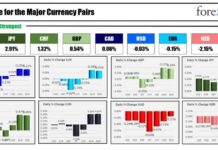America’s Anti-Price-Gouging Laws: Balancing Capitalism and Consumer Protections
In a bold move that has sparked both support and controversy, Kamala Harris, the Vice President of the United States, has proposed a nationwide ban on price gouging. This initiative would mark the first of its kind at the federal level in America, setting a potentially groundbreaking precedent for consumer protection laws. While some may view this policy as a step towards socialism or communism, it is essential to delve deeper into the implications of such legislation on the capitalist framework that underpins the American economy.
The concept of price gouging refers to the practice of raising prices to unfair or excessive levels during times of crisis or high demand, often exploiting consumers’ vulnerabilities. This unethical behavior has been particularly prevalent in situations such as natural disasters, pandemics, or supply chain disruptions, where essential goods and services become scarce. Anti-price-gouging laws aim to prevent such exploitation and ensure that consumers are not taken advantage of in times of need.
At present, 37 states in the U.S. have implemented regulations to curb price gouging, albeit with varying degrees of enforcement and effectiveness. These state-level laws typically define what constitutes “excessive” price increases and outline penalties for violators. While these measures have been instrumental in protecting consumers in certain instances, critics argue that they may hinder the free market principles of capitalism by imposing restrictions on pricing mechanisms.
Proponents of anti-price-gouging laws contend that these regulations are necessary to maintain fairness and prevent unscrupulous businesses from capitalizing on emergencies for profit. They argue that in a truly competitive market, prices should reflect supply and demand dynamics rather than opportunistic exploitation. By curbing price gouging, regulators aim to promote transparency, ethical behavior, and consumer trust in the marketplace.
However, opponents of such laws raise concerns about government intervention in pricing mechanisms, citing potential unintended consequences on market dynamics. They argue that price controls may distort incentives for producers and suppliers, leading to shortages, inefficiencies, and reduced innovation. Moreover, critics warn that excessive regulations could stifle competition, discourage investment, and ultimately harm consumers by limiting choices and availability of goods and services.
Amidst these debates, the proposal for a nationwide ban on price gouging by Vice President Harris has reignited discussions on the balance between consumer protections and capitalist principles. While some view this initiative as a necessary safeguard against exploitation, others caution against overregulation that could impede economic growth and entrepreneurship. The implications of such a policy extend beyond immediate price impacts to broader questions about the role of government in regulating markets.
The Impact of Anti-Price-Gouging Laws on Businesses
For businesses, compliance with anti-price-gouging laws can pose challenges in navigating pricing strategies during turbulent times. While these regulations aim to protect consumers, they also place constraints on companies’ ability to adjust prices in response to changing market conditions. Small businesses, in particular, may struggle to absorb cost increases or supply chain disruptions without passing them on to consumers, raising questions about the sustainability of their operations.
Moreover, the enforcement of anti-price-gouging laws can vary widely across jurisdictions, leading to inconsistencies in interpretation and application. This lack of uniformity creates uncertainty for businesses operating in multiple states and complicates efforts to ensure compliance. Clear guidelines, transparent reporting mechanisms, and consistent enforcement are crucial for fostering a level playing field and promoting ethical business practices.
In the digital age, online platforms and e-commerce have further complicated the landscape of price gouging, with algorithms and automated pricing tools potentially exacerbating opportunistic behavior. The speed and scale of online transactions make it challenging for regulators to monitor and intervene effectively, highlighting the need for robust oversight and enforcement mechanisms in the digital marketplace. As technology continues to evolve, regulators must adapt their approaches to combat new forms of price gouging and protect consumers in the online sphere.
Ethical Considerations and Social Implications
Beyond economic considerations, the debate on anti-price-gouging laws raises ethical questions about fairness, solidarity, and social responsibility. In times of crisis, the moral imperative to prioritize the well-being of vulnerable populations often clashes with profit-driven motives. Advocates of consumer protections argue that prioritizing ethical standards and social welfare is fundamental to a just and equitable society, where individuals are not exploited for financial gain.
From a social perspective, price gouging can exacerbate inequalities and deepen social divisions by disproportionately impacting marginalized communities with limited resources. Vulnerable populations, such as low-income households or elderly individuals, may face heightened vulnerabilities during emergencies, making them more susceptible to price exploitation. Anti-price-gouging laws seek to level the playing field and ensure that all consumers have access to essential goods and services at reasonable prices.
Moreover, the public perception of businesses and their commitment to ethical practices can influence consumer trust and brand loyalty. Companies that prioritize integrity, transparency, and social responsibility are more likely to attract and retain customers who value ethical conduct. By adhering to anti-price-gouging laws and demonstrating a commitment to fair pricing, businesses can enhance their reputation and build long-term relationships with consumers based on trust and integrity.
The Future of Capitalism and Consumer Protections
As the debate on anti-price-gouging laws continues to unfold, it is essential to consider the broader implications for capitalism, consumer protections, and regulatory frameworks. Balancing the principles of free markets with ethical considerations and social welfare remains a complex challenge that requires thoughtful deliberation and collaboration among stakeholders. The evolution of anti-price-gouging laws reflects a shifting paradigm in which economic policies are increasingly scrutinized through the lens of social justice and public interest.
Looking ahead, policymakers, businesses, and consumers must engage in constructive dialogue to address the tensions between market forces and moral imperatives. By fostering transparency, accountability, and ethical behavior, societies can cultivate a culture of responsible capitalism that prioritizes the well-being of individuals and communities. Anti-price-gouging laws serve as a critical tool in this endeavor, signaling a commitment to fairness, integrity, and consumer rights in the marketplace.
In conclusion, the impact of America’s anti-price-gouging laws on capitalism underscores the complexity of balancing economic freedoms with ethical considerations. While regulations play a vital role in protecting consumers and promoting fair competition, they must be implemented judiciously to avoid unintended consequences on market dynamics. By navigating these challenges with prudence and foresight, policymakers can uphold the principles of capitalism while safeguarding the interests of society as a whole.

















